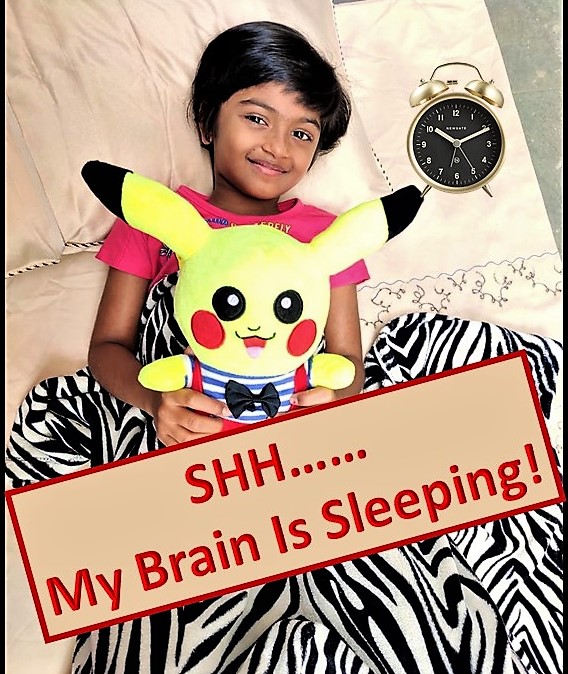
Click here to read this article in Marathi: आरोग्यदायी झोप
Everyone needs sleep! Sleep is an important part of our life1. We spend about one-third of our time in sleeping. It is as essential to survival as food and water.
- Sleep is very important for our physical as well as mental health.
- During sleep, body works to repair muscle, organs, and other cells.
- It works on metabolism, immune function, mood and disease resistance.
- In growing children, growth hormone is formed during sleep.
- Sleep lowers the stress hormone in the body.
- It regulates hunger hormone. Hence, poor sleep can cause weight gain and obesity.
- Sleep is important for number of brain functions. During sleep, our body rests but brain is busy in processing the information which we learn/hear during the day and then creates memories. Removal of toxins from our brain which build up during the day also happens during sleep.
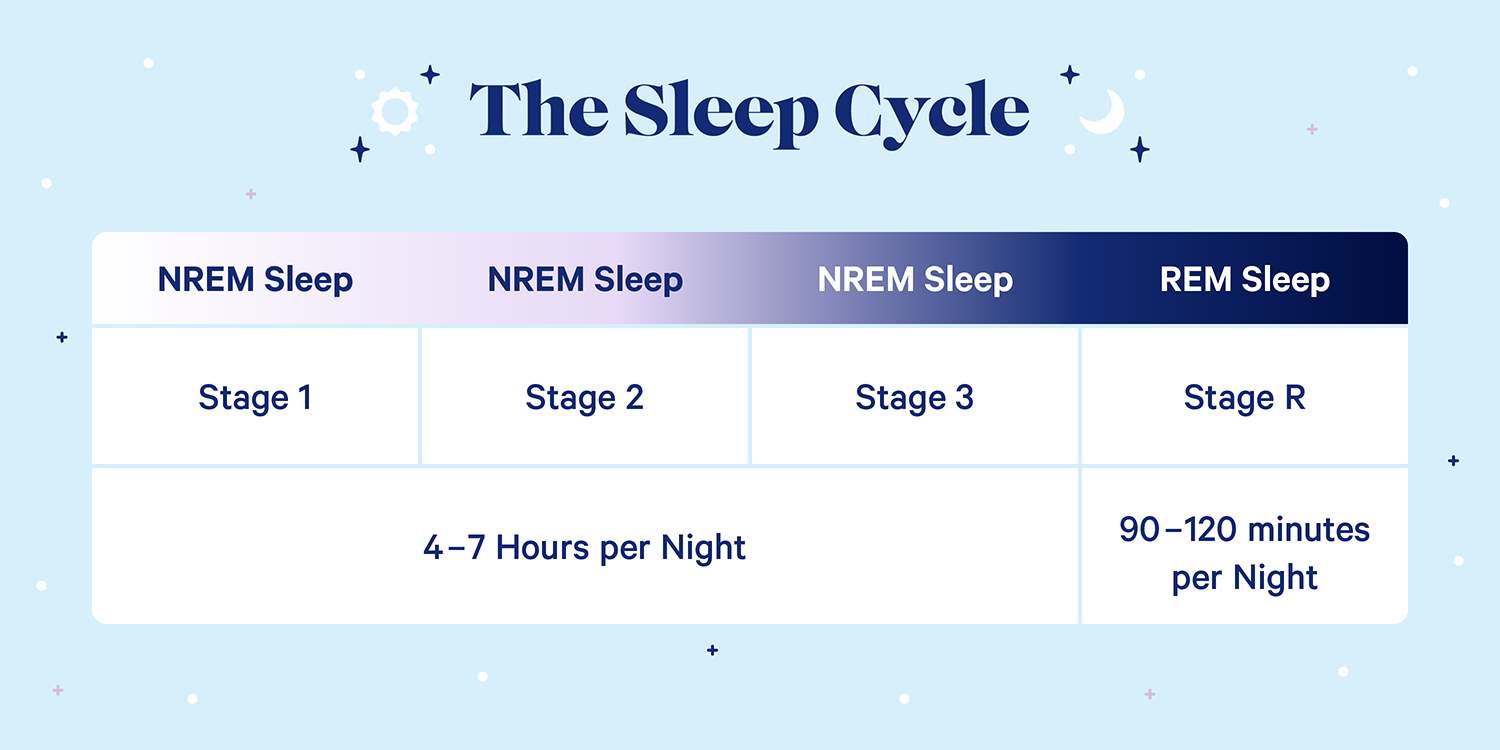
There are two basic types of sleep:
REM (rapid eye movement sleep) is “active” sleep. During REM sleep, brain is active but body is sleeping.5 Most dreaming occurs during REM sleep
and
Non-REM (NREM) sleep is quiet sleep. During the deep states of NREM sleep, blood supply to the muscles is increased, energy is restored, tissue growth and repair occur, and important hormones are released for growth and development.
A circadian rhythm is a natural, internal process that regulates the sleep-wake cycle and repeats roughly every 24 hours. We cycle through all stages of non-REM and REM sleep several times during a typical night. You go through REM and NREM sleep in alternating 90 to 120 minute cycles.
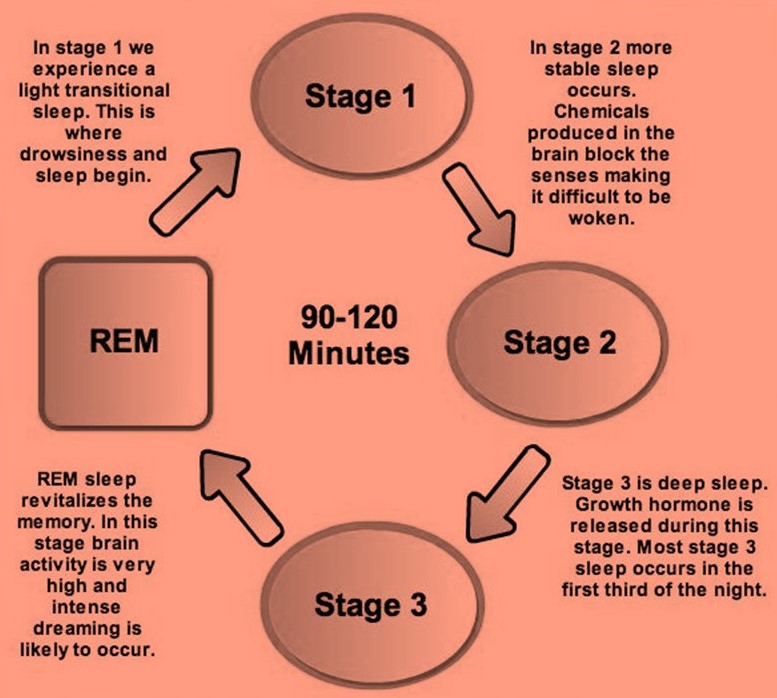 Non-REM (NREM) sleep is subdivided into three stages (N1, N2, N3). The stage N1 is the initial lightest stage and N3 is the deep stage of sleep. Previously, there were 4 stages (N1, N2, N3 and N4). As per new terminology, N3 corresponds to N3+N4. Each is linked to specific brain waves and neuronal activity.
Non-REM (NREM) sleep is subdivided into three stages (N1, N2, N3). The stage N1 is the initial lightest stage and N3 is the deep stage of sleep. Previously, there were 4 stages (N1, N2, N3 and N4). As per new terminology, N3 corresponds to N3+N4. Each is linked to specific brain waves and neuronal activity.
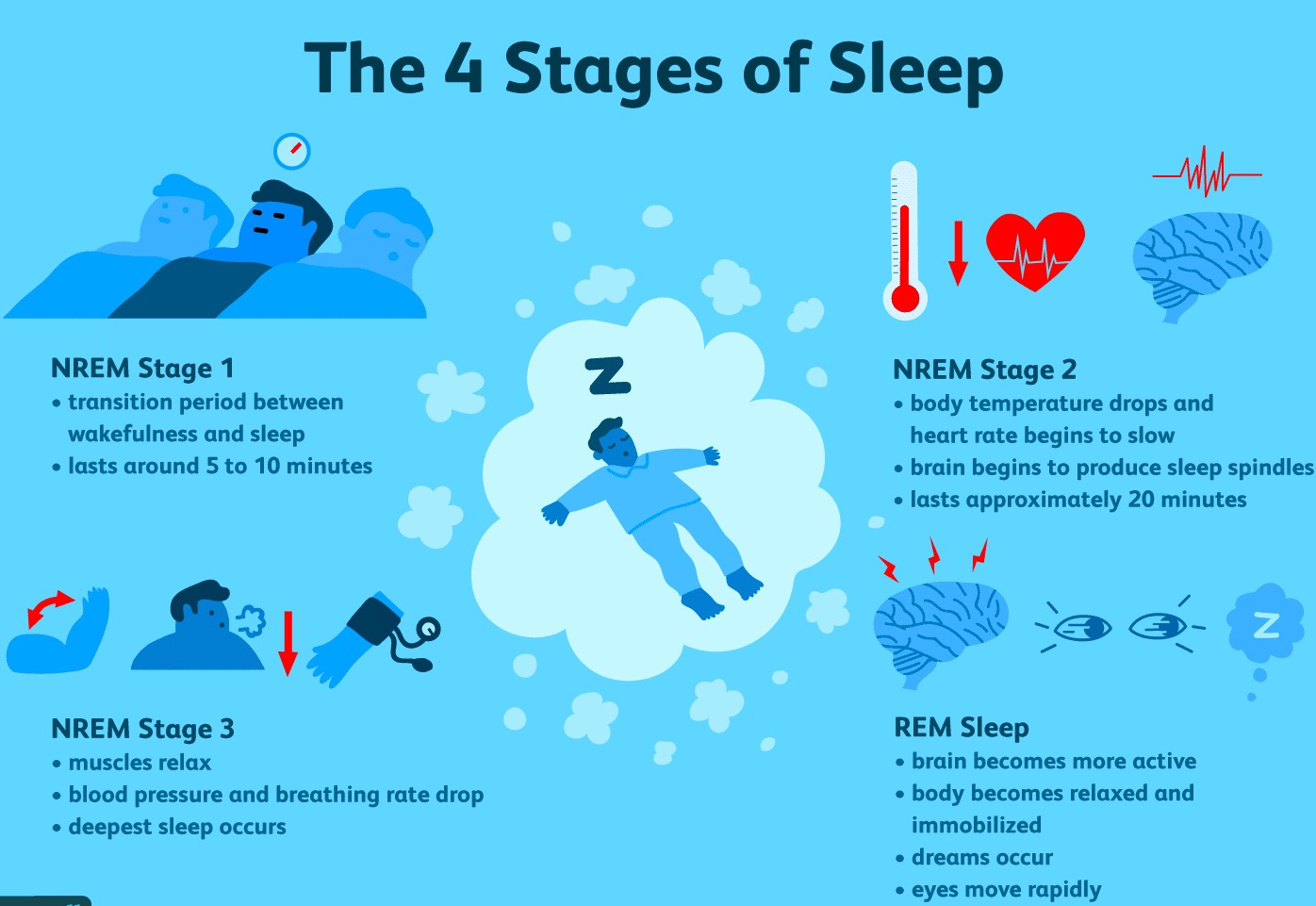
Everyone dreams! We spend about 2 hours each night dreaming but may not remember most of our dreams. Its exact purpose is not yet known, but dreaming may help process our emotions. Events from the day often affects our thoughts during sleep. People suffering from stress or anxiety are more likely to have frightening dreams. Dreams can be experienced in all stages of sleep but usually are most vivid in REM sleep. Some people dream in color, while others only recall dreams in black and white.
Several structures within the brain are involved with sleep.
The hypothalamus, a peanut-sized structure deep inside the brain, contains groups of nerve cells that act as control centers affecting sleep and arousal. Within the hypothalamus is the suprachiasmatic nucleus (SCN) – clusters of thousands of cells that receive information about light exposure directly from the eyes and control your behavioral rhythm.
Most blind people maintain some ability to sense light and are able to modify their sleep/wake cycle.
The pineal gland (also known as third eye), located within the brain’s two hemispheres, receives signals from the SCN and increases production of the sleep hormone melatonin, which helps put you to sleep once the lights go down. This is why it is important to not look at any screen 30 minutes before you go to sleep because it decreases melatonin production, which makes it harder for you to go to sleep and hurts your sleep cycle.
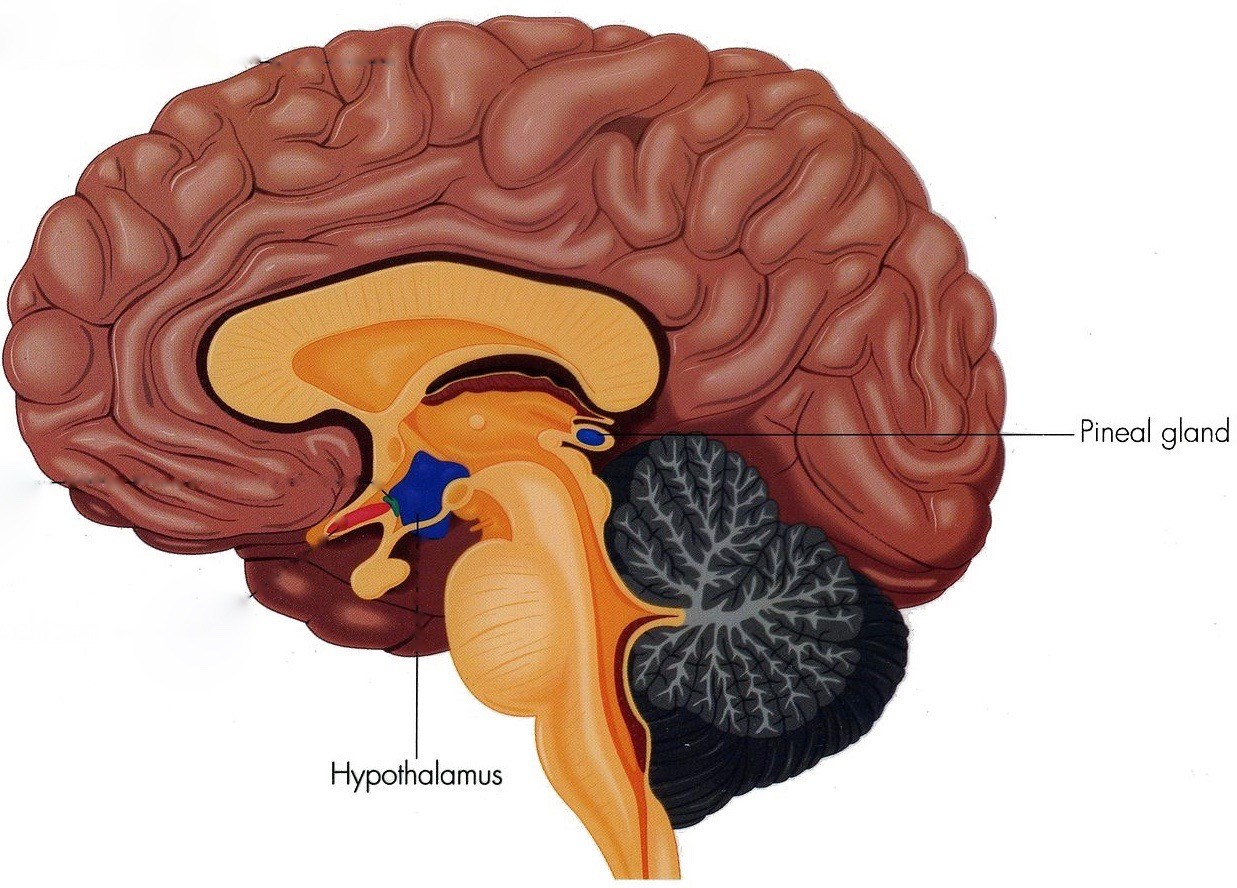
Chemical signals to sleep:
Clusters of sleep-promoting neurons in many parts of the brain become more active as we get ready for bed. Nerve-signaling chemicals called neurotransmitters can “switch off” or dampen the activity of cells that signal arousal or relaxation.
GABA is associated with sleep, muscle relaxation, and sedation.
Norepinephrine and orexin (also called hypocretin) keep some parts of the brain active while we are awake.
Other neurotransmitters that shape sleep and wakefulness include acetylcholine, histamine, adrenaline, cortisol, and serotonin.

The American Academy of Pediatrics (AAP) has issued a Statement of Endorsement supporting the American Academy of Sleep Medicine (AASM) guidelines outlining recommended sleep duration for all ages.
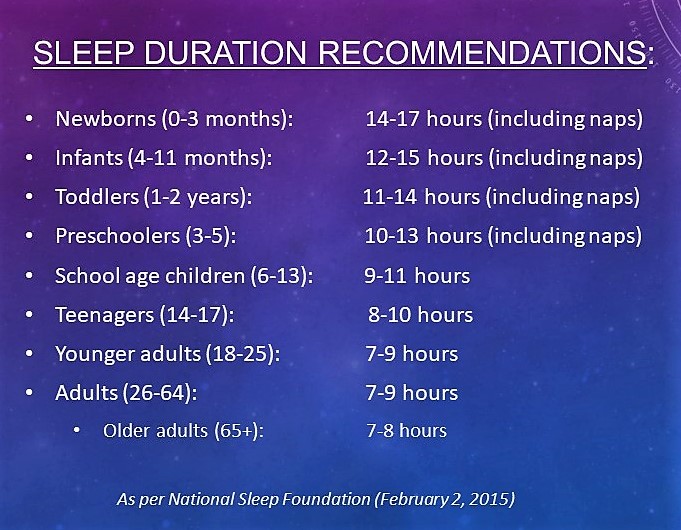
Adequate sleep duration for age on a regular basis leads to improved attention, behavior, learning, memory, emotional regulation, quality of life, and mental and physical health.
The AAP suggests that all screens be turned off 30 minutes before bedtime and that TV, computers and other screens not be allowed in children’s bedrooms. For infants and young children, establishing a bedtime routine is important to ensuring children get adequate sleep each night.
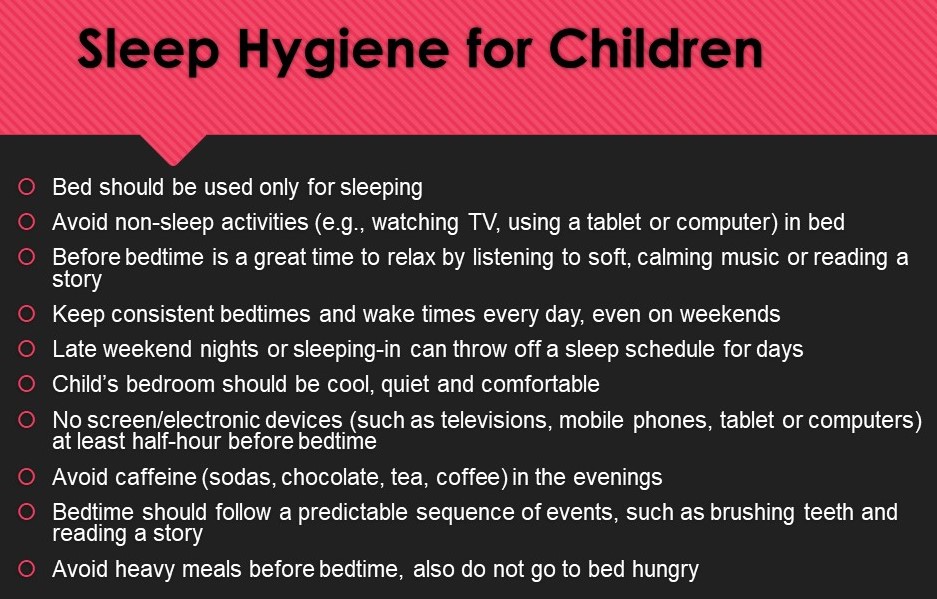
School-aged children become more interested in TV, computers, the media and Internet as well as caffeine products – all of which can lead to difficulty falling asleep, nightmares and disruptions to their sleep. In particular, watching TV close to bedtime has been associated with bedtime resistance, difficulty falling asleep, anxiety around sleep and sleeping fewer hours. Not getting enough sleep each night is associated with an increase in injuries, hypertension, obesity and depression, especially for teens who may experience increased risk of self-harm, anxiety disorders or suicidal thoughts. It can also lead to mood swings, behavioral problems such as ADHD and cognitive problems that impact on their ability to learn in school. Studies have linked poor sleep in children with bad grades in classes such as math, reading, and writing. Poor sleep can trigger migraine headaches in children with migraines. Sleep deprivation can trigger seizures in some seizure disorders.
Many children in the U.S. are chronically sleep deprived. As per Centers for Disease Control (CDC), 6 out of 10 middle schoolers and 7 out of 10 high schoolers do not get enough sleep. National Sleep Foundation (NSF) researchers found that more than two out of every three children ages 10 and under have experienced some type of sleep problem3. The study showed that less sleep at night means more behavioral problems during the day.
Signs of sleep disorders in children may include but are not limited to:
- Snoring
- Breathing pauses during sleep
- Difficulty falling asleep
- Problems with sleeping through the night
- Bed wetting
- Frequent nighttime awakenings
- Morning headaches
- Urge to move legs or other limbs/uncomfortable or painful sensations prompting leg or other limb movement (usually at night)
- Unexplained decrease in daytime performance
- Unusual events during sleep, such as sleepwalking or nightmares
There are many types of sleep problems. The table below gives some idea about different categories of sleep disorders.
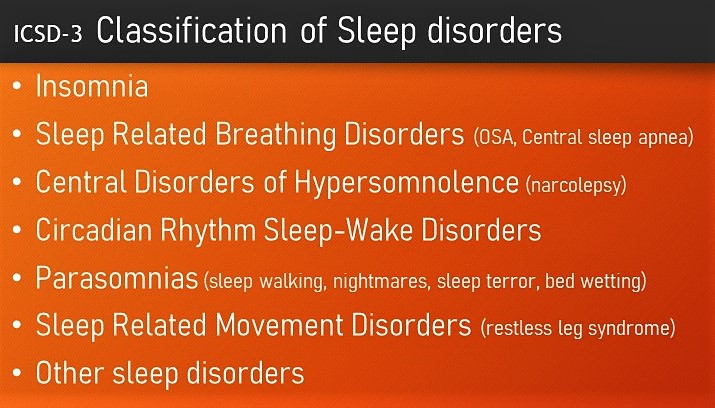
Early diagnosis and treatment of sleep issues are important for long-term physical and mental health, as well as quality of life. If you think your child might have a medical problem that is causing sleep disruption and sleep deprivation, it is important to discuss the signs and symptoms with a healthcare provider or sleep physician.
Overnight sleep study or polysomnography (PSG) is the “gold standard” for the diagnosis of sleep-related breathing disorders (SRBD)4, such as obstructive sleep apnea (OSA), in children and adolescents. Diagnostic tests such as multiple sleep latency test (MSLT) can be useful to explore presence of sleep disorders (e.g., narcolepsy) that can predispose children and adolescents to excessive daytime sleepiness after a normal sleep study (PSG) is performed. Depending upon the diagnosis, child will need further treatments like removal of tonsils/adenoids, continuous positive airway pressure (CPAP) machine and/or medications, weight reduction and treating the underlying medical/psychiatric problems.
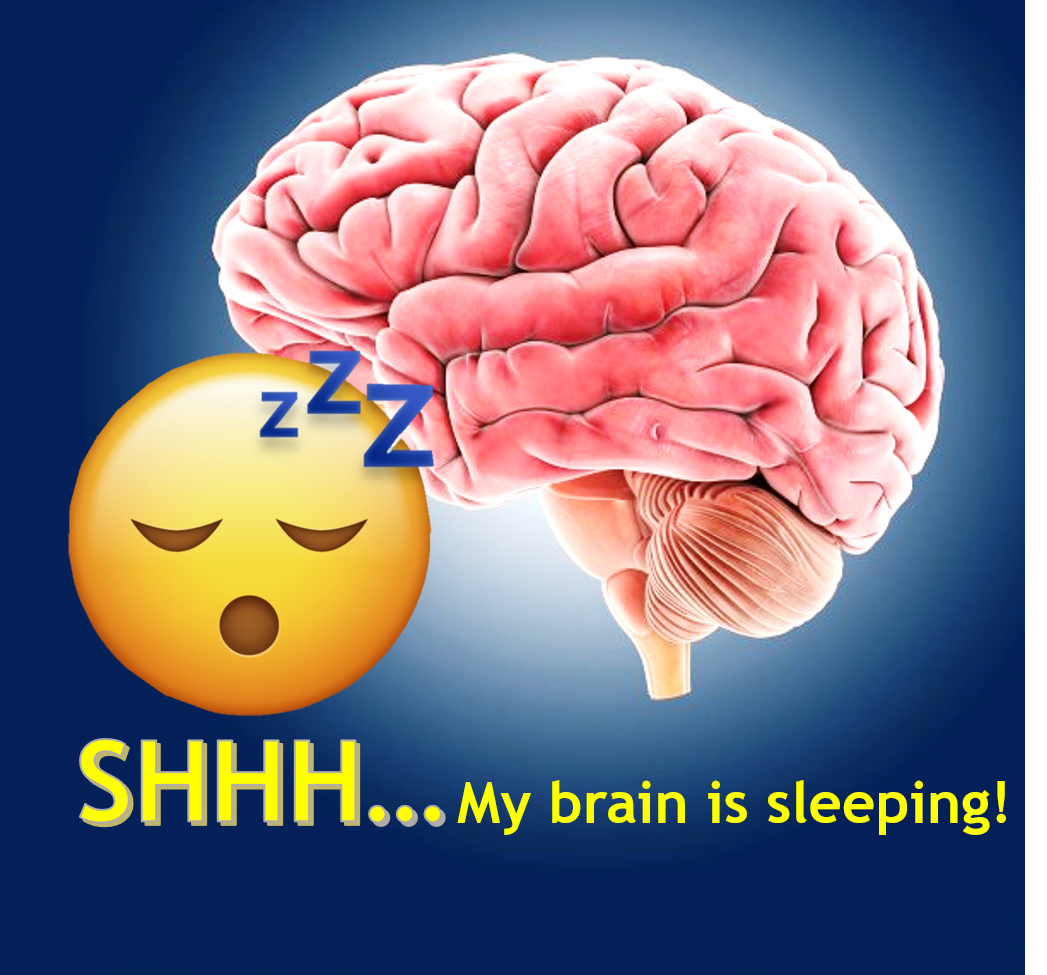
References:
- https://www.ninds.nih.gov/Disorders/Patient-Caregiver-Education/Understanding-Sleep
- https://www.aap.org/en-us/about-the-aap/aap-press-room/Pages/American-Academy-of-Pediatrics-Supports-Childhood-Sleep-Guidelines.aspx
- https://www.webmd.com/children/sleep-disorders-children-symptoms-solutions#1
- https://www.sleepapnea.org/children-and-sleep-apnea/
- https://www.sleepfoundation.org/articles/children-and-sleep

Learnt a lot…
My brain awakening..
Good article
Thank you for your feedback, dear Binoy!
Learnt a lot…
My brain awakening now..
Good article
Very nice Aunty..
Good one! 11-13 hours for my preschool kids!
Very nice article 👍👍
Excellent article. For sound sleep regularity and light dinner before 6pm excellent